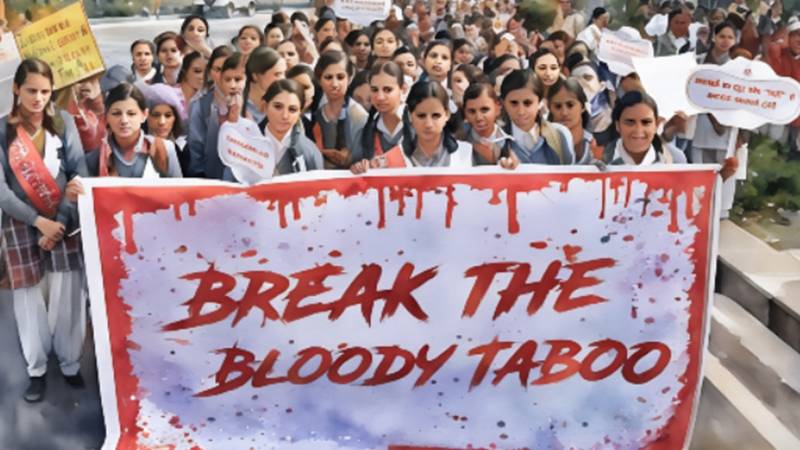
Access to feminine hygiene products remains an urgent global issue, spanning both developed and developing countries. While in the Western world, women can buy necessities like tampons and pads, the stigma surrounding menstruation often prevents society from openly addressing this need. Meanwhile, in many developing nations, millions of women lack access altogether, leading to devastating health, social, and economic consequences
The stigma surrounding menstruation transcends borders. In the United States, despite the widespread availability of products, the term "period" is whispered and rarely discussed openly. This silence contributes to low donation rates for hygiene products, leaving homeless and incarcerated women to fend for themselves. Globally, this stigma takes on even more severe forms. For instance, in Nepal, the practice of chhaupadi forces menstruating women into isolation in cowsheds, exposing them to life-threatening infections and violence. Similarly, in rural India, women are often shamed for their periods and barred from religious and social activities, further isolating them from their communities.
Poor menstrual hygiene management (MHM) has far-reaching health consequences. Studies reveal that women who use reusable absorbent materials, often made from unsanitary cloth or rags, are more likely to develop urogenital infections such as bacterial vaginosis and urinary tract infections. In South Asia, a lack of education on proper menstrual hygiene exacerbates these risks, leaving women unaware of the link between improper care and reproductive health issues.
Research shows that comprehensive school programs on menstrual health significantly improve girls' understanding and management of their periods
For example, in India, the absence of affordable, quality sanitary pads forces women to resort to alternatives like ashes, newspapers, or hay. These materials not only fail to provide adequate protection but also significantly increase the risk of infections. In the United States, incarcerated women often face similar predicaments due to limited supplies, forcing them to reuse disposable products or improvise with toilet paper. Such practices have long-term repercussions, including chronic infections and reproductive health disorders.
The Economic Barrier: Pink Taxes and Luxury Perception
One of the most glaring injustices in the fight for menstrual equity is the 'pink tax.' In the United States, 40 states still classify tampons and pads as non-essential luxury items, subjecting them to sales tax. This classification disregards the biological necessity of these products, burdening women financially. A 2021 study estimated that women spend an average of $13.25 per month on menstrual products, which equates to nearly $6,000 over a lifetime—an unaffordable cost for those living in poverty.
The 'pink tax' is not limited to the United States. In Kenya, before the government eliminated sales tax on sanitary products in 2004, many women were forced to miss work or school during their periods. Despite the policy change, high retail costs and limited distribution channels still prevent access for many rural women. Similar challenges persist in South Asia, where the lack of government subsidies keeps these products out of reach for low-income families.
Several innovative initiatives offer hope for addressing the menstrual hygiene crisis. In India, Arunachalam Muruganantham revolutionised the industry by inventing a low-cost machine to produce sanitary pads from pulverised wood fibre. His initiative has empowered women across 1,300 villages to produce and sell affordable pads, creating a ripple effect of economic and social empowerment.
In Nepal, organisations like the Red Cross are educating girls about menstrual hygiene through school programs, helping to break the cycle of shame and misinformation. By incorporating lessons on menarche and menstrual health into the curriculum, these programs enable girls to seek medical assistance and manage their periods with dignity.
In the West, advocacy groups are pushing for systemic change. For instance, the lawsuit filed in New York against the tampon tax highlights the discriminatory nature of this policy. Five states have already eliminated the tax, setting a precedent for others to follow. On a grassroots level, nonprofits like PERIOD and The Pad Project distribute free hygiene products to homeless shelters and schools, ensuring that women and girls can maintain their dignity during menstruation.
The Role of Education and Awareness
Education remains a cornerstone of change. Research shows that comprehensive school programs on menstrual health significantly improve girls' understanding and management of their periods. For instance, a pilot project in rural Uganda provided reusable pads and education to schoolgirls, reducing absenteeism by 28%. Similar programs could be implemented in South Asia, where cultural taboos often prevent open discussions about menstruation.
Additionally, public campaigns to normalise menstruation can combat stigma. In 2018, India’s Bollywood film Pad Man brought widespread attention to the issue, sparking conversations about menstrual hygiene in a traditionally conservative society. Such cultural interventions are crucial for dismantling deeply ingrained taboos.
Addressing the menstrual hygiene crisis requires a multi-pronged approach involving governments, NGOs, and private enterprises. Policymakers must prioritise removing taxes on hygiene products and subsidising their production and distribution. Schools should incorporate menstrual health into their curricula, and media campaigns should work to normalise discussions about menstruation.
As individuals, we can contribute by donating hygiene products to shelters, supporting organisations that advocate for menstrual equity, and challenging stigmatising language and attitudes. By taking these steps, we can ensure that no woman or girl is held back by something as natural and essential as her period.
Breaking the taboo around menstruation and ensuring access to hygiene products is not just a women’s issue, it’s a human rights issue. Together, we can create a world where every woman has the resources and respect, she deserves.

